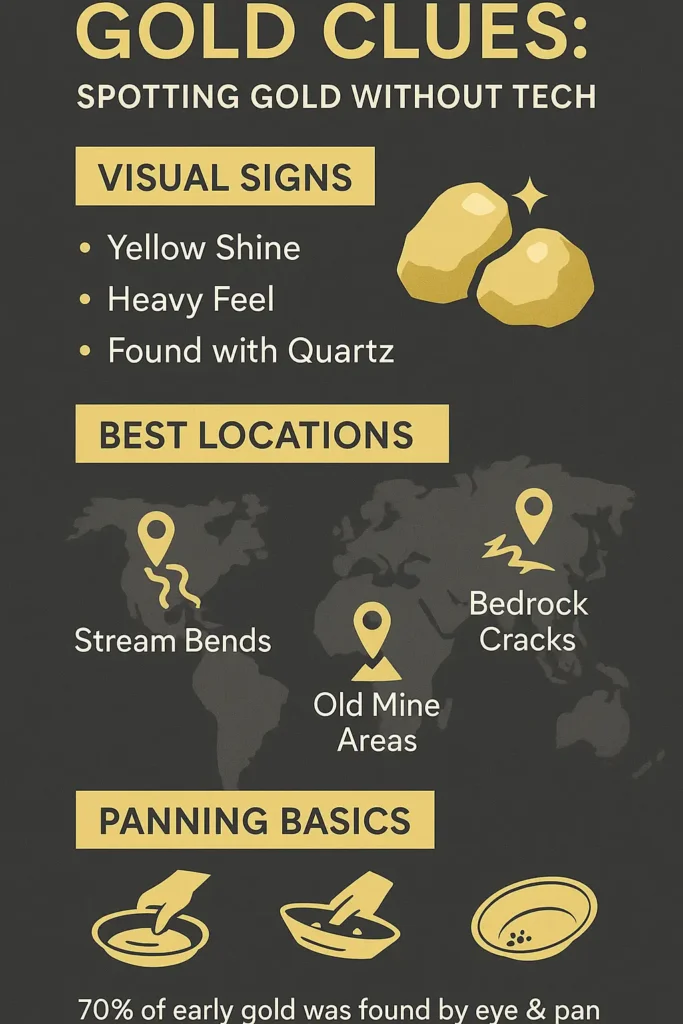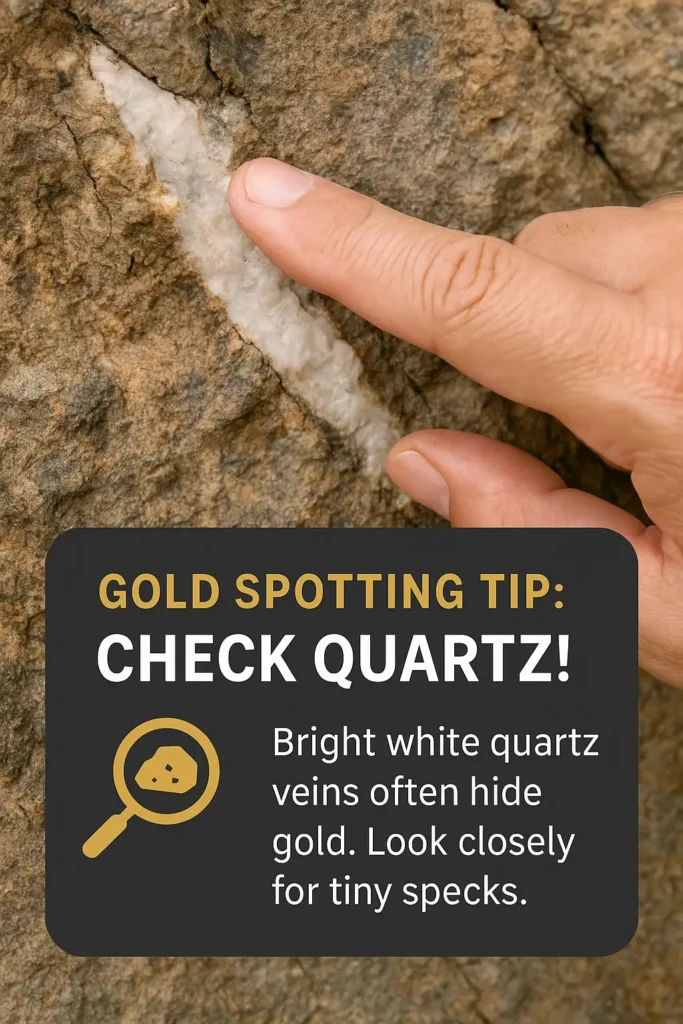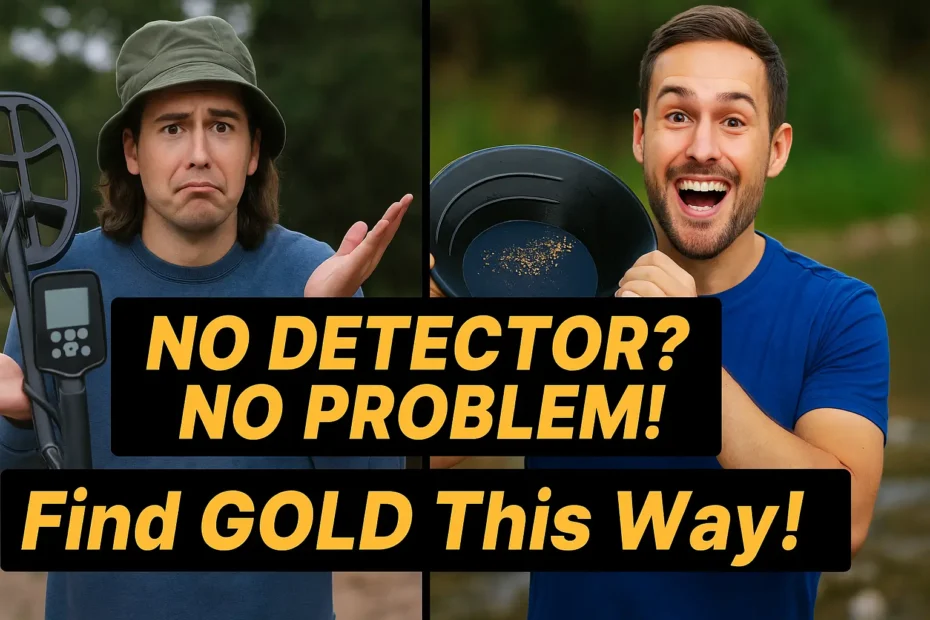You can find gold without a metal detector using simple methods like looking closely, panning, and knowing about rocks. These techniques use observation and basic tools to spot gold.
In a Nutshell: How to Detect Gold Without a Metal Detector
- You will learn several proven ways to find gold.
- You will understand what signs to look for in nature.
- You will get tips to make your gold search easier.
Estimated reading time: 5 minutes
Finding gold can be exciting. You might think you need fancy gear. But people have found gold for centuries without new tools. You can learn simple ways to search for this valuable metal. These methods focus on careful looking and understanding where gold hides.
Look Closely: Visual Gold Spotting
One of the first ways to try is simply looking for gold. This means checking rocks, soil, and stream beds for tiny gold pieces. Gold often looks shiny and has a bright yellow color.

- Where to Look: Focus on places known for gold. Old mining areas or streams can be good spots.
- Helpful Tools: A magnifying glass helps see small gold bits. Binoculars can be useful too.
- Best Light: The sun in the early morning or late afternoon can make gold shine. This makes it easier to see.
Gold Panning: A Classic Method
Gold panning is an old and effective way to find gold. You use a special pan to separate gold from dirt and gravel.
Simple Steps for Panning:
- Put some soil and gravel into your pan.
- Add water to the pan.
- Swirl the pan gently. This makes heavy gold sink.
- Tilt the pan to let water and light material wash out.
- Keep swirling until only gold is left at the bottom.
Using a pan with a smooth inside helps. Practice your swirling to get better.
Using a Sluice Box for More Gold
A sluice box can help you search more material than a pan. It’s a long box with ridges inside called riffles. These riffles catch gold as water washes soil and gravel through.
Buy Gold Online: The Smart and Secure Way
Discover the safest and most reliable strategies to buy gold online. Make informed investment decisions and secure your financial future today!
Learn More- How to Set Up: Place the sluice box in a stream with flowing water. You can also use a hose in dry areas.
- Adding Material: Put your soil and gravel at the top end.
- Water Power: Let water flow through the box. It washes away lighter stuff. Gold gets trapped in the riffles.
Know Your Rocks: Geological Clues
Understanding a bit about rocks can lead you to gold. Gold is often found in certain types of environments.

Signs to Watch For:
- Quartz Veins: Gold is often found near white quartz rock.
- Stream Beds: Streams can wear down rocks and carry gold. Look in areas where water slows down.
- Iron Staining: Rocks stained red or orange by iron can sometimes be near gold.
Learning about gold ore can also be very helpful.
Other Ways: Bioprospecting and Dry Washing
There are other smart ways to find gold.
Bioprospecting: This method uses plants or even tiny living things like bacteria. Some plants soak up minerals from the ground. If these plants have lots of certain minerals, gold might be nearby. Some experts explain what bioprospecting is in more detail.
Dry Washing: If you are in a dry, desert-like place, dry washing can work. This method uses a machine called a dry washer. It uses puffs of air instead of water to separate gold from dry dirt.
Chemical Tests: Scientists can use chemical tests. An acid test uses strong acids to see if a metal is real gold. Another test is XRF, which uses X-rays. These are often done in a lab.
- Research Hotspots: Look up old maps or geology reports. Find areas where gold was found before.
- Check Crevices: Gold often settles in cracks in bedrock. Carefully clean these out.
- Follow the Water: In streams, check the inside bends and behind large rocks. Gold drops where water slows.
- Sample Often: Take small samples from many spots. This helps you find where gold is more common.
Tips for Your Gold Hunt
Finding gold takes time and effort. Here are a few things to remember:
- Be Patient: You might not find gold right away. Keep trying.
- Do Your Homework: Learn about the area. Has gold been found there before? Knowing about different gold mining methods can also give you ideas.
- Keep Gear Clean: Clean tools work best.
You can definitely find gold without a metal detector. Learning these methods and practicing them can help you. It is a rewarding skill to develop.
A quick checklist for what to bring when you’re ready to try finding gold without a metal detector.
Gold Finding Essentials (No Detector)
Your Questions About How to Detect Gold Without a Metal Detector Answered (Simply)
What is the easiest way to find gold without a detector?
How can I identify gold in a rock?
Where is gold most commonly found in nature?
Can you find gold in any creek?
What tools do I need for gold panning?
Is it legal to search for gold?
How does dry washing for gold work?



